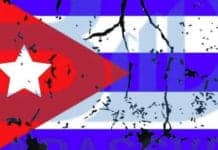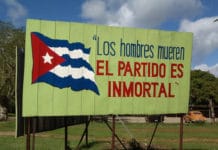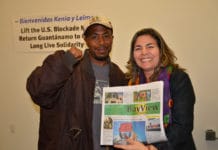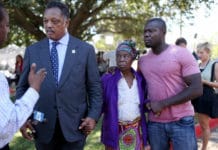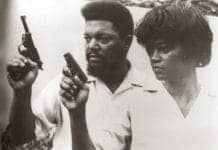Editor’s update: Cuba’s Minister of Foreign Affairs Bruno Rodriguez Parrilla said Jan. 14 that the 344 Cuban doctors volunteering in Haiti have already cared for almost 700 earthquake victims. His Ministry is coordinating with other Cuban institutions to send emergency medical supplies and more Cuban doctors and nurses. No humanitarian aid or aid workers sent by the U.S. government have yet arrived in Haiti two days after the quake.
by Mumia Abu-Jamal

Black, a fervent supporter of the Cuban Revolution, joined the Venceremos Brigades, an annual trek of foreigners to the island, who assisted in harvesting the sugar crop and other agricultural work.
Although he was in his mid-to-high 70s at the time, Black did his part, until the searing tropical heat or perhaps the work, or both, took its toll.
Black was taken to a nearby hospital and received what he called “excellent treatment.” As he was leaving, he reached for his wallet and began pulling out some bucks. The doctor looked at him quizzically – and then told him to put his money away.
“We treated you because you were sick, Senor,” the doctor explained, “not for the money.”
These words blew Black away, and this experience with socialist medicine moved him deeply.
What is even more remarkable is that Cuba was doing this during its “Special Period,” a time of economic chaos when its biggest trading partner, the Soviet Union, stopped bartering things for things – as in oil for sugar, for example – and began demanding cold cash for trade.
As of 2006, Cuba had a gross domestic product (GDP) of $45 billion – about the same as the Congo or the Sultanate of Oman ($44.1 billion). The GDP measures the market value of goods and services purchased within a nation over a given period of time – usually a year.
Do you want to know what the U.S. GDP was for 2007? Over $13 trillion. $13 trillion.
Guess which country provides free medical care?
The richest nation in earth’s history can’t agree on how to insure that its citizens get good health care, balking over the economic interests of insurance and pharmaceutical companies.
One of the poorest nations on earth – Cuba – not only provides free universal health care, but it provides well-trained, humanistic doctors to developing and poor countries all over the world. In fact, there are more Cuban doctors helping people overseas than there are from the U.N.’s World Health Organization (WHO).
Cuba also has a lower infant mortality rate and a higher life expectancy than the United States.
We need to stop rapping about so-called health care and call it what it is: wealth care.
© Copyright 2010 Mumia Abu-Jamal. Read Mumia’s brand new book, “Jailhouse Lawyers: Prisoners Defending Prisoners v. the U.S.A.,” available from City Lights Publishing, www.citylights.com or (415) 362-8193. Keep updated at www.freemumia.com. For Mumia’s commentaries, visit www.prisonradio.org. For recent interviews with Mumia, visit www.blockreportradio.com. Encourage the media to publish and broadcast Mumia’s commentaries and interviews. Send our brotha some love and light at: Mumia Abu-Jamal, AM 8335, SCI-Greene, 175 Progress Dr., Waynesburg PA 15370.
Health care
by Jean Damu
In 1995 I was in Cuba for a month. I developed a sore on my foot and my friend took me to the hospital to have it treated. Naturally I was charged nothing for the treatment and a pittance for the medicine. Two weeks later, I was walking up 23rd Avenue in Havana when a bus passed by and a woman on board began calling my name. The woman, a Black woman, got off at the next stop and jogged back to where I was standing, wondering who it possibly could be?
Turned out she was the doctor at the hospital who had treated me and she wanted to know how my foot was doing! Demanded to see it right there on the street to satisfy herself the sore had disappeared.
The other significant fact here is that in 1995 it was very difficult to get a bus in Cuba and it must have been a huge sacrifice on her part to get off to inquire about my progress. I can’t imagine this happening anywhere else in the world.
Jean Damu is the former western regional representative for N’COBRA, National Coalition of Blacks for Reparations in America, and a former member of the International Brotherhood of Sleeping Car Porters, taught Black Studies at the University of New Mexico, has traveled and written extensively in Cuba and Africa and currently serves as a member of the Steering Committee of the Black Alliance for Just Immigration. Email him at jdamu2@yahoo.com.

 Store
Store



